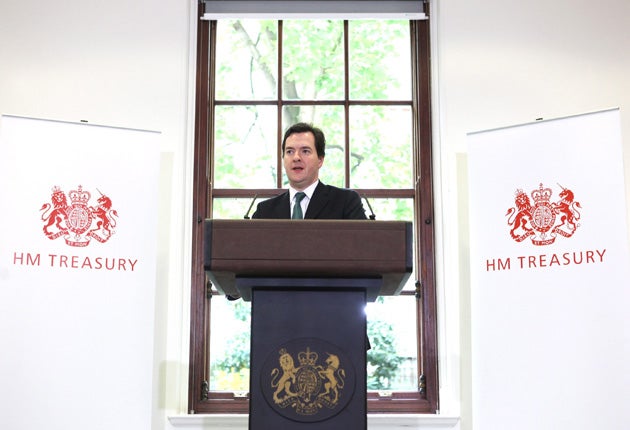Coalition to rush through £6bn of cuts and give up power to forecast growth

Almost £6bn of spending cuts will be rushed out next Monday as the Government begins its attempts to reduce Britain's record peacetime public deficit of £163bn this year.
David Laws, the Liberal Democrat who is Chief Treasury Secretary, is sharpening the axe even though his party opposed immediate cuts during the election campaign. His "hit list" is expected to include curbs on recruitment; the use of consultants; scaling back quangos; doubling the expected savings on IT projects; scrapping "wasteful projects" like identity cards; cutting the bills from 70 major suppliers; lower property costs and squeezing advertising budgets.
Yesterday Mr Laws argued that the cuts would not reduce the quality of "key" frontline services. At a press conference, he did not dispute suggestions that the Tory Chancellor George Osborne wanted his Liberal Democrat hand to be "dipped in the blood" of the cuts. However, Mr Laws added that the coalition would not be sustainable unless both partners accepted responsibility over its biggest challenge. He pledged to make sure that "the key decisions are informed by Liberal Democrat values."
Mr Laws revealed that his predecessor, Liam Byrne, had left him a note saying: "Dear Chief Secretary, I'm afraid there is no money. Kind regards – and good luck! Liam."
But any humour is likely to have been lost on Mr Laws, who last night claimed that the new government had discovered spending decisions made by Labour ministers which had gone "against accounting officers' advice". "What we don't know yet and we probably never will unless the information is published in 30 years time is whether the Chancellor of the Exchequer, or even the Prime Minister perhaps, over-ruled officials in the department," he told BBC2's Newsnight. "And I'm not making that claim because I haven't got evidence for it."
Mr Laws ordered ministers to re-examine all spending approved since January. Proposals that needed Treasury approval will have to be resubmitted. Pilot schemes will be halted if they are judged too costly to implement fully.
Asked to explain the Liberal Democrats' U-turn on their election stance that cuts this year would risk a double-dip recession, Mr Laws said the Bank of England and Treasury believed it would be "safe to make this judgement without risking the economic recovery".
He said: "The Chancellor and I are united in our resolve to deal urgently with the unacceptable state of our public finances. It is both possible and necessary to start taking action this year."
Mr Laws revealed that he had already vetoed some cuts proposed by civil servants. "I will reject any proposals which would damage key services or put at risk those on lower incomes," he said.
The scale of the total cuts will emerge in Mr Osborne's emergency Budget, which he will deliver on 22 June. This will reveal the shares of the deficit reduction plan to be met from spending cuts and tax rises. Mr Osborne said the "broad rule of thumb" would be 80 per cent from cuts and 20 per cent from higher taxes – but the Liberal Democrats favoured a bigger share being met from taxes. He said the £6bn cuts would mean saving only £1 in every £100 of public spending, although much deeper cuts will be unveiled this autumn.
Carl Emmerson, the deputy director of the Institute for Fiscal Studies, said that protecting health and aid spending would mean that other departments faced cuts averaging 25 per cent.
Mr Osborne surrendered the Chancellor's power to make forecasts for growth and public borrowing to an independent Office of Budget Responsibility, whose head will be Sir Alan Budd, the Treasury's former chief economic adviser. Insisting he would be making a rod for his own back and those of his successors, the Chancellor said: "We need to fix the Budget to fit the figures, not fix the figures to fit the Budget."
Lord Forsyth of Drumlean, who headed a tax reform commission for David Cameron, criticised the Government's plan to implement a Liberal Democrat proposal to raise capital gains tax (CGT) from 18 per cent to 40 or 50 per cent on the sale of second homes and shares. "This will have a devastating effect on, for example, people who bought buy-to-let properties as part of their pension investments," he said.
The Chancellor insisted that reform of CGT was unavoidable because of the "enormous amount of income shifting" by people looking to avoid paying income tax. Mr Osborne said that, while plans to raise the threshold for inheritance tax had been dropped, the coalition's agreement included a "very substantial piece of assistance" to middle earners through higher income tax allowances.
Where the axe may fall
*Quangos: cost of the 766 bodies rose to £46.5bn last year; some could be axed or merged, others face budget squeeze
*Consultants: David Cameron describes the £1.5bn-a-year bill for outside consultants as "outrageous"
*Recruitment: freeze on filling some vacant posts and cutting cost of agency and contract staff could save £1bn-£2bn
*Wasteful projects: both coalition parties believe national identity card scheme should be scrapped
*Computer projects: advisers to Tories while in opposition found that IT savings of £2bn could be achieved
*Suppliers: renegotiating contracts of 70 goods and services suppliers could save up to £3bn, according to Tory advisers
*Advertising: Tories claim Labour used £232m Whitehall budget for party-political purposes; £50m public-health campaigns may be squeezed
Join our commenting forum
Join thought-provoking conversations, follow other Independent readers and see their replies
Comments
Bookmark popover
Removed from bookmarks